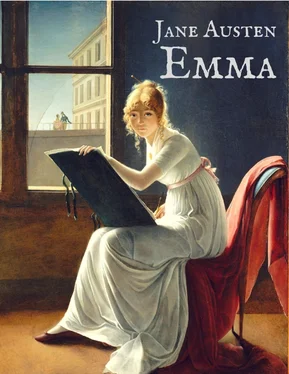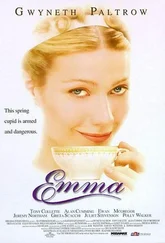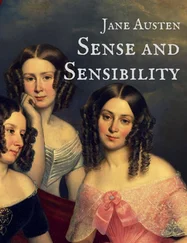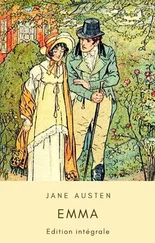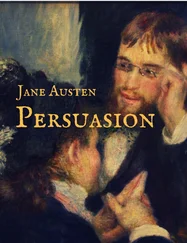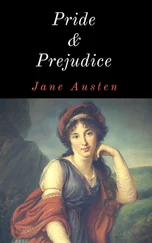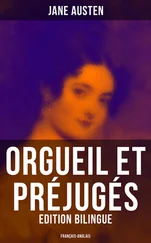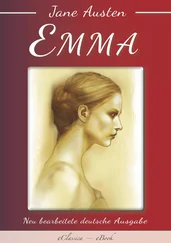“Where is the young man?” said John Knightley. “Has he been here on this occasion—or has he not?”
“He has not been here yet,” replied Emma. “There was a strong expectation of his coming soon after the marriage, but it ended in nothing; and I have not heard him mentioned lately.”
“But you should tell them of the letter, my dear,” said her father. “He wrote a letter to poor Mrs. Weston, to congratulate her, and a very proper, handsome letter it was. She shewed it to me. I thought it very well done of him indeed. Whether it was his own idea you know, one cannot tell. He is but young, and his uncle, perhaps—”
“My dear papa, he is three-and-twenty. You forget how time passes.”
“Three-and-twenty!—is he indeed?—Well, I could not have thought it—and he was but two years old when he lost his poor mother! Well, time does fly indeed!—and my memory is very bad. However, it was an exceeding good, pretty letter, and gave Mr. and Mrs. Weston a great deal of pleasure. I remember it was written from Weymouth, and dated Sept. 28th—and began, 'My dear Madam,' but I forget how it went on; and it was signed 'F. C. Weston Churchill.'—I remember that perfectly.”
“How very pleasing and proper of him!” cried the good-hearted Mrs. John Knightley. “I have no doubt of his being a most amiable young man. But how sad it is that he should not live at home with his father! There is something so shocking in a child's being taken away from his parents and natural home! I never could comprehend how Mr. Weston could part with him. To give up one's child! I really never could think well of any body who proposed such a thing to any body else.”
“Nobody ever did think well of the Churchills, I fancy,” observed Mr. John Knightley coolly. “But you need not imagine Mr. Weston to have felt what you would feel in giving up Henry or John. Mr. Weston is rather an easy, cheerful-tempered man, than a man of strong feelings; he takes things as he finds them, and makes enjoyment of them somehow or other, depending, I suspect, much more upon what is called society for his comforts, that is, upon the power of eating and drinking, and playing whist with his neighbours five times a week, than upon family affection, or any thing that home affords.”
Emma could not like what bordered on a reflection on Mr. Weston, and had half a mind to take it up; but she struggled, and let it pass. She would keep the peace if possible; and there was something honourable and valuable in the strong domestic habits, the all-sufficiency of home to himself, whence resulted her brother's disposition to look down on the common rate of social intercourse, and those to whom it was important.—It had a high claim to forbearance.
Mr. Knightley was to dine with them—rather against the inclination of Mr. Woodhouse, who did not like that any one should share with him in Isabella's first day. Emma's sense of right however had decided it; and besides the consideration of what was due to each brother, she had particular pleasure, from the circumstance of the late disagreement between Mr. Knightley and herself, in procuring him the proper invitation.
She hoped they might now become friends again. She thought it was time to make up. Making-up indeed would not do. She certainly had not been in the wrong, and he would never own that he had. Concession must be out of the question; but it was time to appear to forget that they had ever quarrelled; and she hoped it might rather assist the restoration of friendship, that when he came into the room she had one of the children with her—the youngest, a nice little girl about eight months old, who was now making her first visit to Hartfield, and very happy to be danced about in her aunt's arms. It did assist; for though he began with grave looks and short questions, he was soon led on to talk of them all in the usual way, and to take the child out of her arms with all the unceremoniousness of perfect amity. Emma felt they were friends again; and the conviction giving her at first great satisfaction, and then a little sauciness, she could not help saying, as he was admiring the baby,
“What a comfort it is, that we think alike about our nephews and nieces. As to men and women, our opinions are sometimes very different; but with regard to these children, I observe we never disagree.”
“If you were as much guided by nature in your estimate of men and women, and as little under the power of fancy and whim in your dealings with them, as you are where these children are concerned, we might always think alike.”
“To be sure—our discordancies must always arise from my being in the wrong.”
“Yes,” said he, smiling—“and reason good. I was sixteen years old when you were born.”
“A material difference then,” she replied—“and no doubt you were much my superior in judgment at that period of our lives; but does not the lapse of one-and-twenty years bring our understandings a good deal nearer?”
“Yes—a good deal nearer .”
“But still, not near enough to give me a chance of being right, if we think differently.”
“I have still the advantage of you by sixteen years' experience, and by not being a pretty young woman and a spoiled child. Come, my dear Emma, let us be friends, and say no more about it. Tell your aunt, little Emma, that she ought to set you a better example than to be renewing old grievances, and that if she were not wrong before, she is now.”
“That's true,” she cried—“very true. Little Emma, grow up a better woman than your aunt. Be infinitely cleverer and not half so conceited. Now, Mr. Knightley, a word or two more, and I have done. As far as good intentions went, we were both right, and I must say that no effects on my side of the argument have yet proved wrong. I only want to know that Mr. Martin is not very, very bitterly disappointed.”
“A man cannot be more so,” was his short, full answer.
“Ah!—Indeed I am very sorry.—Come, shake hands with me.”
This had just taken place and with great cordiality, when John Knightley made his appearance, and “How d'ye do, George?” and “John, how are you?” succeeded in the true English style, burying under a calmness that seemed all but indifference, the real attachment which would have led either of them, if requisite, to do every thing for the good of the other.
The evening was quiet and conversable, as Mr. Woodhouse declined cards entirely for the sake of comfortable talk with his dear Isabella, and the little party made two natural divisions; on one side he and his daughter; on the other the two Mr. Knightleys; their subjects totally distinct, or very rarely mixing—and Emma only occasionally joining in one or the other.
The brothers talked of their own concerns and pursuits, but principally of those of the elder, whose temper was by much the most communicative, and who was always the greater talker. As a magistrate, he had generally some point of law to consult John about, or, at least, some curious anecdote to give; and as a farmer, as keeping in hand the home-farm at Donwell, he had to tell what every field was to bear next year, and to give all such local information as could not fail of being interesting to a brother whose home it had equally been the longest part of his life, and whose attachments were strong. The plan of a drain, the change of a fence, the felling of a tree, and the destination of every acre for wheat, turnips, or spring corn, was entered into with as much equality of interest by John, as his cooler manners rendered possible; and if his willing brother ever left him any thing to inquire about, his inquiries even approached a tone of eagerness.
While they were thus comfortably occupied, Mr. Woodhouse was enjoying a full flow of happy regrets and fearful affection with his daughter.
Читать дальше
